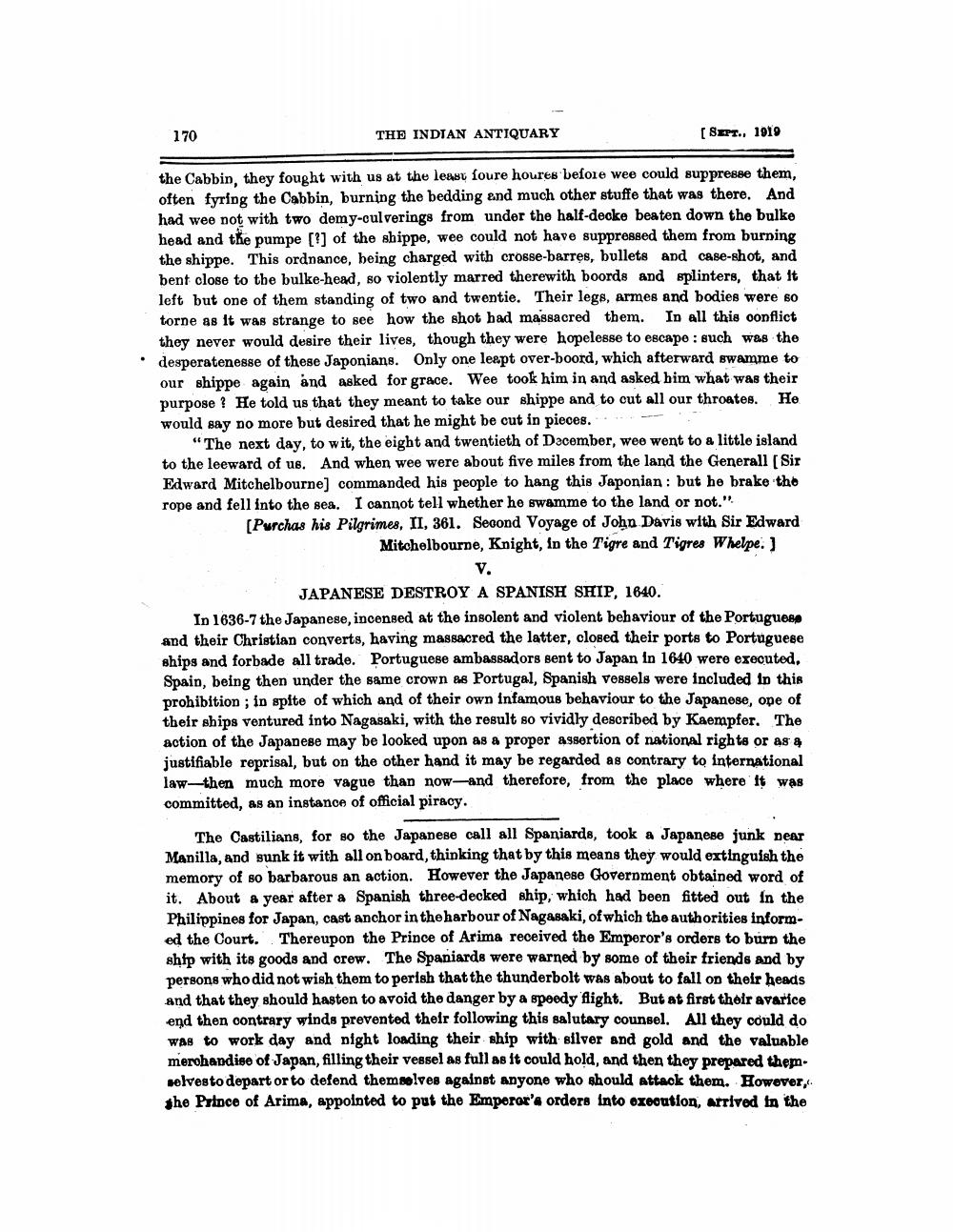________________
170
THE INDIAN ANTIQUARY
(SEPT., 1919
the Cabbin, they fought with us at the least foure houres before wee could suppresse them, often fyring the Cabbin, burning the bedding and much other stuffe that was there. And had wee not with two demy-culverings from under the half-deoke beaten down the bulke head and the pumpe [?] of the shippe, wee could not have suppressed them from burning the shippe. This ordnance, being charged with crosse-barres, bullets and case-shot, and bent close to the bulke-head, so violently marred therewith boords and splinters, that it left but one of them standing of two and twentie. Their legs, armes and bodies were so torne as it was strange to see how the shot bad massacred them. In all this oonflict they never would desire their lives, though they were hopelesse to escape : such was the desperatenesse of these Japonians. Only one le&pt over-boord, which afterward swamme to our shippe again and asked for grace. Wee took him in and asked him what was their purpose ? He told us that they meant to take our shippe and to cut all our throates. He would say no more but desired that he might be cut in pieces.
"The next day, to wit, the eight and twentieth of December, wee went to a little island to the leeward of us. And when wee were about five miles from the land the Generall [Sir Edward Mitchelbourne) commanded his people to hang this Japonian: but he brake tho rope and fell into the sea. I cannot tell whether he swamme to the land or not." (Purchas his Pilgrimes, II, 361. Second Voyage of John Davis with Sir Edward
Mitchelbourne, Knight, in the Tigre and Tigres Whelpe. )
V. JAPANESE DESTROY A SPANISH SHIP, 1640. In 1636-7 the Japanese, incensed at the insolent and violent behaviour of the Portuguese and their Christian converts, having massacred the latter, closed their ports to Portuguese ship, and forbade all trade. Portuguese ambassadors sent to Japan in 1640 were executed, Spain, being then under the same crown & Portugal, Spanish vessels were included in this prohibition ; in spite of which and of their own infamous behaviour to the Japanese, ope of their ships ventured into Nagasaki, with the result so vividly described by Kaempfer. The action of the Japanese may be looked upon as a proper assertion of national rights or as 8 justifiable reprisal, but on the other hand it may be regarded as contrary to international law-then much more vague than now and therefore, from the place where it was committed, as an instance of official piracy.
The Castilians, for so the Japanese call all Spaniards, took a Japanese junk near Manilla, and sunk it with all on board, thinking that by this means they would extinguish the memory of so barbarous an action. However the Japanese Government obtained word of it. About a year after a Spanish three-decked ship, which had been fitted out in the Philippines for Japan, cast anchor in the harbour of Nagasaki, of which the authorities informed the Court. Thereupon the Prince of Arima received the Emperor's orders to burn the ship with its goods and crew. The Spaniards were warned by some of their friends and by persons who did not wish them to perish that the thunderbolt was about to fall on their heads and that they should hasten to avoid the danger by a spoody Aight. But at first thoir avarice end then contrary winds prevented their following this salutary counsel. All they could do was to work day and night londing their ship with silver and gold and the valuable merohandise of Japan, filling their vessel as full as it could hold, and then they prepared them. selves to depart or to defend themsolves against anyone who should attack them. However, the Prince of Arima, appointed to put the Emperor's orders into oxecution, arrived in the




